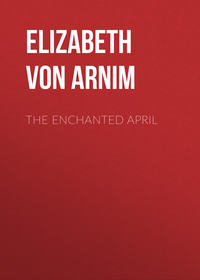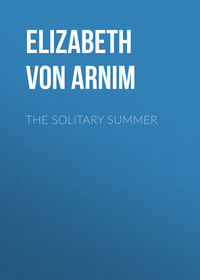 полная версия
полная версияThe Pastor's Wife
She put up her hand to get courage by feeling the ring, for her spirit was fainting within her—she had just caught sight of the cathedral. The ring had been slung on the chain alongside the confirmation cross because it was impossible to wear it on her thumb; and out there in Switzerland, where one was simple, it had seemed a most natural and obvious place to put it. Yet now, as the fly rattled over the cobbles of the Close and the familiar cathedral rose before her like a menace, she hung her head and greatly doubted but what the juxtaposition was wicked.
Nobody was on the doorstep when she arrived beneath the great cedar that spread its shade, an intensified bit of dripping gloom where all was gloom and dripping, across from the lawn to the Palace's entrance, except the butler, whose black clothes struck her instantly as very neat and smooth, and his underling, a youth kept carefully a little on the side of a suitable episcopal shabbiness. She had telegraphed her train from Paddington, but that, of course, was no reason why any one should be on the doorstep. It was she whose business lay with doorsteps when people arrived or left, she was the one who welcomed and who sped, and, since she could not welcome herself, there was nobody there to do it.
She stole a nervous look at Wilson as he helped her out, but his face was a blank. The boy on her other side had an expression, she thought, as though under happier conditions he might have let himself go in a smirk, and she turned her eyes away with a little sick feeling. Did they know already, all of them, that she had left her aunt's a week ago? But, indeed, that seemed a small thing now compared with the things she had done since.
"I'm a dead girl," thought Ingeborg, as she passed beneath her parents' porch.
The servants brought in her luggage, off which in her newness at deceit she had not thought to scrape the continental labels, and she crossed the hall, treading on the dim splashes of lovely blurred colour that fell from the vast stained glass windows on to the stone flags of its floor. It was the noblest hall, as bare of stuffs and carpets as the cathedral itself, and she looked more than insignificant going across it to the carved oak door that opened into the wide panelled passage leading to the drawing-room, a little figure braced to a miserable courage, the smallest thing to be going to defy powers of which this magnificence was only one of the expressions.
Her mother was as usual on her sofa near a fire whose heat, that warm day, was mitigated by the windows being wide open. Beside her was her own particular table with the usual flowers, needlework, devotional books, and biographies of good men. It was difficult to believe her mother had got off that sofa nine times to go to bed, had dressed and undressed and had meals—thirty-six of them, counted Ingeborg mechanically, while she looked about for the Bishop, if you excluded the before breakfast tea, forty-five if you didn't—since she saw her last, so immovable did she appear, so exactly in the same position and composed into the same lines as she had been nine days before. The room was full of the singing of thrushes, quite deafeningly full, as she opened the door, for the windows gave straight into the green and soppy garden and it was a day of many worms. Judith was making tea as far away from the fire as she could get, and there was no sign of the Bishop.
"Is that you, Ingeborg?" said her mother, turning her face, grown pale with years of being shut up, to the door.
Ingeborg's mother had found the sofa as other people find salvation. She was not ill. She had simply discovered in it a refuge and a very present help in all the troubles and turmoil of life, and in especial a shield and buckler when it came to dealing with the Bishop. It is not easy for the married, she had found when first casting about for one, to hit on a refuge from each other that shall be honourable to both. In a moment of insight she perceived the sofa. Here was a blameless object that would separate her entirely from duties and responsibilities of every sort. It was respectable; it was unassailably effective; it was not included in the Commandments. All she had to do was to cling to it, and nobody could make her do or be anything. She accordingly got on to it and had stayed there ever since, mysteriously frail, an object of solicitude and sympathy, a being before whose helplessness the most aggressive or aggrieved husband must needs be helpless, too. And she had gradually acquired the sofa look, and was now very definitely a slightly plaintive but persistently patient Christian lady.
"Is that you, Ingeborg?" she said, turning her head.
"Yes, mother," said Ingeborg, hesitating in spite of herself on the threshold.
She looked round anxiously, but the Bishop was not lurking anywhere in the big room.
"Come in, dear, and shut the door. You see the windows are open."
Judith glanced up at her a moment from her tea-making and did not move. Even in the midst of her terrors Ingeborg was astonished, after not having seen it for a while, at her loveliness. She seemed to have taken the sodden greys of the afternoon, the dulness and the gathering dusk, and made out of their gloom the one perfect background for her beauty.
"We thought you would have written," said Mrs. Bullivant, putting her cheek in a position convenient for the kiss that was to be applied to it.
"I—I telegraphed," said Ingeborg, applying the kiss.
"Yes, dear, but only about your train."
"I—thought that was enough."
"But, Ingeborg dear, such a great occasion. One of the great occasions of life. We did expect a little notice, didn't we, Judith?"
"Notice?" said Ingeborg faintly.
"Your father was wounded, dear. He thought it showed so little real love for your parents and your sister."
"But—" said Ingeborg, looking from one to the other.
"We wrote to you at once—directly we knew. Didn't we, Judith?"
"Of course," said Judith.
Ingeborg stood flushing and turning pale. Had one of the Dent's Tour people somehow found out where she lived and written about her engagement and the impossible had happened and they weren't going to mind? Was it possible? Did they know? And were taking it like this? If only she had called at her aunt's house on the way to Paddington and got the letters—what miserable hours of terror she would have been spared!
"But—" she began. Then the immense relief of it suddenly flooded her whole being with a delicious warm softness. They did know. Somehow. And a miracle had happened. Oh, how kind God was!
She dropped on her knees by the sofa and began to kiss her mother's hand, which surprised Mrs. Bullivant; and indeed it is a foreign trick, picked up mostly by those who go abroad. "Mother," she said, "are you really pleased about it? You don't mind then?"
"Mind?" said Mrs. Bullivant.
"Oh, how glad, how glad I am. And father? What does he say? Does he—does he mind?"
"Mind?" repeated Mrs. Bullivant.
"Father is very pleased, I think," said Judith, with what in one less lovely would have been a slight pursing of the lips. And she twisted a remarkable diamond ring she was wearing straight.
"Father is—pleased?" echoed Ingeborg, quite awe-struck by the amount and quality of these reliefs.
"I must say I think it is really good of your dear father to be pleased, when he loses—" began Mrs. Bullivant.
"Oh, yes, yes," interrupted the overcome Ingeborg, "it's a wonder—a wonder of God."
"Ingeborg dear," her mother gently rebuked, for this was excess; and Judith looked still more what would have been a little pursed in any other woman.
"When he loses," then resumed Mrs. Bullivant with the plaintive determination of one who considers it the least she may expect as a sofa-ridden mother to be allowed to finish her sentences, "so much."
"Yes, yes," assented Ingeborg eagerly, whose appreciation of her parents' attitude was so warm that she almost felt she must stay and bask in its urbanity forever and not go away after all to the bleak distance of East Prussia.
"Your father loses not only a daughter," continued Mrs. Bullivant, "but £500 a year of his income."
"Would one call it his income?" inquired Judith, politely but yet, if one could suspect a being with an angel's face of such a thing, with some slight annoyance. "I thought our grandmother—"
"Judith dear, the £500 a year your grandmother left to each of you was only to be yours when you married," explained Mrs. Bullivant, also with some slight annoyance beneath her patience. "Till you married it was to be mine—your father's, I mean, of course. And if you never did marry it would have been mine—I mean his—always."
Ingeborg had heard of her Swedish grandmother's will, but had long ago forgotten it, marriage being remote and money never of any interest to her who had no occasions for spending. Now her heart bounded with yet more thankfulness. What a comfort it would be to Robert. How it would help him in his research. Extraordinary that she should have forgotten it. When he told her of his stipend of five thousand marks—£250 it was in English money, he explained, and there was the house and land free—most of which went in his experiments, but what was left being ample, he said, for the living purposes of reasonable beings if they approached it in a proper spirit, it all depending, he said, on whether they approached it in a proper spirit. "And after all," he had added triumphantly, throwing out his chest just as she was about to inquire what the proper spirit was, "no man can call me thin—"—to think she had forgotten the substantial help she was going to be able to bring him!
The full splendour of her father's generosity in being pleased at her engagement was now revealed to her. The relief of it. The glad, warm relief. So must one feel who is born again, all new, all clean from old mistakes and fears. She felt lifted up, extraordinarily happy, extraordinarily good, more in harmony with Providence and the Bible than she had been since childhood. She would have been willing, and indeed found it perfectly natural, to kneel down with her mother and Judith then and there and say prayers together out loud. She would have been willing on the crest of her wave of gratefulness quite readily to give up Herr Dremmel in return for the family's immense kindness in not asking her to give him up. She had felt nothing like this exaltation before in her life, this complete being in harmony with the infinite, this confidence in the inherent goodness of things, except on the afternoon her tooth was pulled out.
"Oh," she exclaimed, laying her cheek on her mother's hand, "oh, I do hope you'll like Robert!"
"Robert?" said Mrs. Bullivant; and at the tea-table there was a sudden silence among the cups, as though they were holding their breath.
"His name's Robert," said Ingeborg, still with her cheek on her mother's hand, her eyes shut, her face a vision of snuggest, safest contentment.
"What Robert, Ingeborg?" inquired Mrs. Bullivant, shifting her position to stare down more conveniently at her daughter.
"Herr Dremmel. It's his Christian name. He's got to have one, you know," said Ingeborg, still with her eyes shut in the blissfulness of perfect confidence.
"Herr who?" said Mrs. Bullivant, a sharper note of life in her voice than there had been for years. "Here's your father," she added quickly, hastily composing herself into the lines of the unassailable invalid again as the door opened and the Bishop came in.
Ingeborg jumped up. "Oh, father," she cried, running to him with the entire want of shyness one may conceive in the newly washed and forgiven soul when it first arrives in heaven and meets its Maker and knows there are going to be no more misunderstandings for ever, "how good you've been!"
And she kissed him so fervently in a room gone so silent that the kiss sounded quite loud.
The Bishop was nettled.
Was he then at any time not good? His daughter's excessive gratitude, really almost noisy gratitude, for what after all had been inevitable, the permission to go up to London and place herself in the hands of a dentist, suggested that humaneness on his part came to her as a surprise. He did feel he had been good to let her go, but he also felt he would have been not good if he had not let her go. Certainly Redchester opinion would have condemned him as cruel even if he himself, who knew all the circumstances, was not able to think so. What had really been cruel was the terrible muddle his papers and letters had got into owing to her prolonged absence. Grave dislocations had taken place in the joints of his engagements, several with far-reaching results; and all because, he could not help feeling, Ingeborg, in spite of precept and example, did not in her earlier years use her toothbrush with regularity and conscientiousness. Manifestly she did not, or how could she have needed nine enormous days to be set in repair? He himself, who regarded his body as a holy temple, which was the one solution of the body question that at all approached satisfactoriness, and had accordingly brushed his teeth, from the point of view of their being pillars of a sacred edifice, after every meal for forty years, had never had a toothache in his life.
"Let us hope now, Ingeborg," he said, reflecting on the instance she had provided of the modern inversion of the Mosaic law which visited the sins of the fathers on the children, the original arrangement, the Bishop felt, being considerably healthier, and gently putting her away in order to go over to the tea-table where he stood holding out his hand for the cup Judith hastened to place in it, "let us now hope, now you have had your lesson, that in future you will remember cleanliness is next to godliness."
And this seemed to Ingeborg an answer so surprising that she could only stare at him with her mouth fallen a little open, there where he had left her in the middle of the carpet.
But the Bishop had not done. He went on to say another thing that surprised her still more; nay, smote her cold, shook her to her foundations. He said, after a pause during which the silence in the room was remarkable, his back turned to her while at the tea-table he carefully selected the particular piece of bread and butter he intended to eat, "And pray, Ingeborg, why did you not write the moment you heard from us, and congratulate your sister on her engagement?"
CHAPTER VIII
Ingeborg was dumb.
Her father's question was like a blow, shocking her back to consciousness. The warm dream that all was well, that she was understood, that there was love and kindliness for her at home after all and welcome and encouragement, the warm feeling of stretching herself in her family's kind lap, confident that it would hold her up and not spill her out on to the floor, was gone in a flash. She was hit awake, hit out of her brief delicious sleep. Her family had not got a lap, but it had an entirely unprepared mind, and into that unprepared mind she had tumbled the name of Dremmel.
"Judith—engaged?" she stammered faintly, on the Bishop's wheeling round, cup in hand, to examine into the cause of her prolonged silence.
"Your incredulity is not very flattering to your sister," he said; and Judith's eyelashes as she concentrated her gaze on the teapot were alone sufficiently lovely, the curved, dusky-golden soft things, to make incredulity simply silly.
Mrs. Bullivant avoided all speech and clung to her sofa.
"It's—so sudden," faltered Ingeborg.
"Much may happen in a week," said the Bishop.
"Yes," murmured Ingeborg, who knew that terribly, too.
"We never can tell what a day may bring forth," said the Bishop; and Ingeborg, deeply convinced, drooped her head acquiescent.
"No man," began the Bishop, habit being strong within him, "knoweth the hour when the bridegroom—" But he stopped, recollecting that Ingeborg was not engaged and therefore could not with propriety be talked to of bridegrooms. Instead, he inquired again why she had not written; and eyeing her searchingly asked himself if it were possible that a child of his could be base enough to envy.
"I—didn't get the letters," said Ingeborg, her head drooping.
"You did not? That is very strange. Your mother wrote at once. Let me see. It was on Friday it happened. It was Friday, was it not, Judith? You ought to know"—Judith blushed obediently—"and to-day is Tuesday. Ample time. Ample time. My dear," he said, turning to his wife who at once twitched into a condition of yet further relaxed defencelessness, "do you think it possible your letter was not posted?"
"Quite, Herbert," murmured Mrs. Bullivant, closing her eyes and endeavouring to imagine herself unconscious.
"Ah. Then that's it. That's it. Wilson is growing careless. This last week there have been repeated negligences. You will make inquiries, Ingeborg, and tell him what I have said."
"Yes, father."
"And you will discharge him if he goes on like this."
"Yes, father."
"Unfaithful servant. Unfaithful servant. He that is unfaithful in a few things—"
The Bishop, frowning at it, took a second piece of bread and butter, and went over to the hearthrug, where he stood from force of habit, in spite of the warmth of the day, drinking his tea, and becoming vaguely and increasingly irritated by the action of the fire behind him.
"Then," he said, looking at Ingeborg, "you know nothing about it?"
She shook her head. She was the oddest figure in the middle of the splendid old room, travel-stained, untidy, her face white with fatigue, her hat crooked.
Judith glanced at her every now and then, but it was impossible at any time to tell what the delicate white rose at the tea-table was thinking; so impossible that the young men who clustered round her like bees when they first saw her gave it up and went on presently to more communicative flowers. The local Duchess had hoped her first-born would marry him—a creature so lovely, so entirely respectable with that nice Bishop for a father, and so happily adapted in the perfection of her proportions for the successful production of further dukes; and she pointed out various aspects of the girl's exquisiteness to her son, and told him he would have the most beautiful wife in England. But the young man, after a reproachful look at his mother for supposing he could have missed noticing even the humblest approach to a pretty woman let alone Judith Bullivant, said he didn't want to marry a picture but something that was alive and, anyhow, something that talked.
"She's right enough, of course," he remarked, "and I like looking at her. I'd be blind if I didn't. But Lord, dull? The girl hasn't got a word to say for herself. I never met any woman who looked so ripping and then somehow wasn't. She won't talk. She won't talk," he almost wailed. "She ain't got the remotest resemblance to anything approaching kick in her."
"You might end by being thankful for that," said his mother.
He would not, however, be persuaded, and went his way and married, as the Duchess had feared, a young lady from the halls—a young lady nimble not only of toes but of wits, nimble, that is to say, as he proudly pointed out to his mother, at both ends, with whom he lived in great contentment, for she amused him, which is much.
"I have not observed you offer any congratulations, Ingeborg," said the Bishop, becoming more and more displeased by her strange behaviour, and not at all liking her crumpled and forlorn appearance. He again thought of envy, but that alone could not crumple clothes. "And yet your sister," he said, getting a little further away from the fire which had begun to scorch him unpleasantly, "is to be the wife of the Master."
"The Master?" repeated Ingeborg, stupidly. For a moment her tormented brain supposed Judith must be going to be a nun.
"There is only one Master," said the Bishop, in his stateliest manner. "Everybody knows that. The Master of Ananias."
Ingeborg knew this was a great thing. The Master of Ananias, the most celebrated of Oxford colleges, was in every way, except perhaps that of age, desirable; but what was age when it came to all the other desirabilities? Her father had rebuked her once for speaking of him as old Dr. Abbot, and had informed her the Master was only sixty, and that everybody was sixty—that is, said the Bishop, everybody of any sense. He was not a widower, he was pleasant to look at in a shaven iron-grey way, he was brilliantly erudite, and extremely well off apart from his handsome salary, one of the handsomest salaries in the gift of the Crown. Several years before, when Judith was still invisible in a pinafore, he had stayed at the Palace—it was then Ingeborg spoke of him as old—and had been treated by her father with every attention and respect: He had on that occasion seemed glad to go. Now it appeared he had been again, and must have fallen immediately—and overwhelmingly in love with Judith for his short visit to bridge the distance between a first acquaintance and an engagement. Who, however, knew better than herself how quickly such distances can be bridged?
She wanted to go and kiss Judith and say sweet things to her, but her feet seemed unable to move. She wanted to congratulate everybody with all her heart if only they would be kind and congratulate her a little, too. For Judith had heard what she said before her father came in, and her mother had heard it, and the room was heavy with the uttered name of Dremmel.
She looked round at them—her father waiting for her to show at least ordinary decency and feeling, Judith so safe in the family's approval, so entirely clear from hidden things, her mother lying with closed eyes and expressionless face, and she suddenly felt intolerably alone.
"Oh, oh—" she cried, holding out her hands, "doesn't anybody love me?"
This was worse than her toothache.
Her family had endured much during those days, but at least there was a reason then for the odder parts of her behaviour. Now they were called upon to endure the distressing spectacle of a hitherto reserved relative letting herself go to unbridledness. Ingeborg was going to make a scene; and a scene was a thing that had never yet, anyhow not during the entire Bullivant period, been made in that house.
Mrs. Bullivant shut her eyes tighter and tried to think she was not there at all.
Judith turned red and again became absorbed in the teapot.
The Bishop, after the first cold shock natural to a person called upon to contemplate nakedness where up to then there had been clothes, put down his cup on the nearest table and, with an exaggerated calm, stared.
They all felt intensely uncomfortable; as uncomfortable as though she had begun, in the middle of the drawing-room, to remove her garments one by one and cast them from her.
"This is very sad, Ingeborg," said the Bishop.
"Isn't it—oh, isn't it—" was her unexpected answer, tears in her eyes. She was so tired, so frightened. She had been travelling hard since the morning of the day before. She had had nothing to eat for a time that seemed infinite. And yet this was the moment, just because she had betrayed herself to her mother and Judith, in which she was going to have to tell her father what she had done.
"It is the most distressing example," said the Bishop, "I have ever seen of that basest of sins, envy."
"Envy?" said Ingeborg. "Oh, no—that's not what it is. Oh, if it were only that! And I do congratulate Judith. Judith, I do, I do, my dear. But—father, I've been doing it too."
It was out now, and she looked at him with miserable eyes, prepared for the worst.
"Doing what, Ingeborg?"
"I'm engaged, too."
"Engaged? My dear Ingeborg."
The Bishop was alarmed for her sanity. She really looked very strange. Had they been giving her too much gas?
His tone became careful and humouring. "How can you," he said quietly, "have become engaged in these few days?"
"Much may happen in a week," said Ingeborg. It jumped out. She did try not to say it. She was unnerved. And always when she was unnerved she said the first thing that came into her head, and always it was either unfortunate or devastating.
The Bishop became encased in ice. This was not hysteria, it was something immeasurably worse.
"Be so good as to explain," he said sharply, and waves of icy air seemed to issue from where he stood and heave through the room.









